Helps Busy Executives to Tap Growing Online Professional Network
 March 18, 2007, Chicago, USA—Today, The Global Human Capital Journal released its Review and The Unofficial LinkedIn User”s Guide to aid executives and professionals to mine the hidden value of the rapidly growing website. Founded in 2003, LinkedIn is a leading “social” network site for managing business relationships. It currently has over nine million global members who collaborate for professional purposes. March 18, 2007, Chicago, USA—Today, The Global Human Capital Journal released its Review and The Unofficial LinkedIn User”s Guide to aid executives and professionals to mine the hidden value of the rapidly growing website. Founded in 2003, LinkedIn is a leading “social” network site for managing business relationships. It currently has over nine million global members who collaborate for professional purposes.
LinkedIn represents a transformation opportunity for the Global Human Capital Journal”s executive readership. Business and government leaders can significantly increase their ability to execute strategy by leveraging emerging peer to peer knowledge networks. Notably, an executive”s LinkedIn network is beholden to no employer and can increase mobility.
However, online social networks represent a new social milieu. Most executives interviewed by the GHCJ showed a clear mental gap in understanding the potential of online professional networks. Interviewees included LinkedIn members and nonmembers.
GHCJ Chief Editor Christopher Rollyson, a known networker in high tech and corporate circles, explained the motivation for the project:
“I saw a disconnect between LinkedIn and some of the people who would benefit most by using it—corporate executives and […]
How to Increase Your Payback from Using LinkedIn
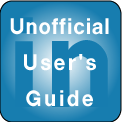 LinkedIn is a “social” site that will prove to be of rare benefit to business executives and professionals in building individualized collaborative networks, as I explained in detail in the GHCJ Review of LinkedIn. However, LinkedIn is seriously lacking in providing a step-by-step guide to help the motivated executive to tap its real value. The functionality of the website is easy to use, but many of the finer points of LinkedIn are lost on the majority of users. This guide attempts to address that. LinkedIn is a “social” site that will prove to be of rare benefit to business executives and professionals in building individualized collaborative networks, as I explained in detail in the GHCJ Review of LinkedIn. However, LinkedIn is seriously lacking in providing a step-by-step guide to help the motivated executive to tap its real value. The functionality of the website is easy to use, but many of the finer points of LinkedIn are lost on the majority of users. This guide attempts to address that.
[…]
Valuable Space to Create Your Professional Knowledge Network
 LinkedIn is a social network website that enables people to build and manage (mostly) business connections in order to discover jobs, ventures, new clients, etc. Unlike other social networking sites, its focus is business rather than social or entertainment. LinkedIn is a social network website that enables people to build and manage (mostly) business connections in order to discover jobs, ventures, new clients, etc. Unlike other social networking sites, its focus is business rather than social or entertainment.
LinkedIn is emerging as a dominant networking environment for executives and professionals, and its development will be of interest as both an immensely practical tool and as a study of the social network phenomenon. Founded in 2003, LinkedIn crossed the chasm in 2007, as the company reports that thousands of people are joining per day. Today, it has more than 9 million members, and membership is very global.
As valuable as LinkedIn is, one of the company’s weakest points is making itself approachable to executives. For example, I recently attended an Illinois IT Association Sales Round Table at which attendees represented a broad range of executives, IT management and professionals and were no strangers to developing relationships and business development. Presenter Steve Weinberg gave an excellent presentation on LinkedIn’s potential and features. Listening to the interaction of the at-capacity crowd, I was impressed by […]
Web 2.0 Is Transforming Relationships Between Customers and Companies*
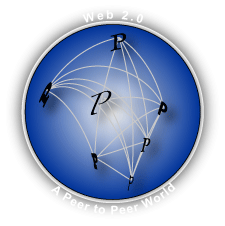 I’ll risk using a hype-laden term like “Web 2.0” in the title: I think most of us have been around long enough to understand that hype doesn’t mean that nothing is there, although it can distract us from seeing things that we should be watching. I’ll risk using a hype-laden term like “Web 2.0” in the title: I think most of us have been around long enough to understand that hype doesn’t mean that nothing is there, although it can distract us from seeing things that we should be watching.
I have been in the thick of the “adoption curves” of Java, e-business transformation and SOA/Web services (detail). They have been instrumental in creating a new information infrastructure and business process capabilities. “Web 2.0” will prove to be the most transformational so far because it is changing relationships. It changes individuals’ relationships with each other, and it will change how companies and the customers relate to each other. It will demand “Marketing 2.0.”
Tectonic Shift
As I argued in The 3.x Economies, we are transitioning away from the Industrial Economy and entering the Knowledge Economy. In the Industrial Economy, companies created value by manufacturing products efficiently based on their core competencies, and they marketed products to customers. They also created and marketed services on a large scale. “Marketing” grew as a profession during the 20th century when […]
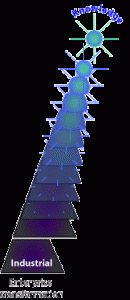 What does the Knowledge Economy Portend for the Industrial Economy organization? What does the Knowledge Economy Portend for the Industrial Economy organization?
Today, most of the world’s global commercial and governmental organizations increasingly find themselves confronted by the Knowledge Economy’s new success factors, which are often contrary to the Industrial Economy’s. Compounding the challenge, past competitors have had similar structures and limitations to incumbents’, which gave everyone more time to adapt to change; however, new Knowledge Economy competitors often do not have the same structures and limitations. Technology and globalization are changing the rules of engagement.
These developments leave industrial companies in an awkward situation. Now, they need to excel at collaborative innovation—historically a weak point—to capture and hold customers’ attention. In the Knowledge Economy, innovation will replace efficiency as the primary driver of value creation. Competitors that can engage rapidly shifting customer desires will dominate.
To succeed, incumbents must quickly become more adaptive and collaborative with external partners and customers. Moreover, they must transform themselves while they continue to operate at increasing levels of performance.
Industrial Economy Success Factors Knowledge Economy Success Factors Deliver vast quantity and low prices to relatively few broad […]
We Must Rethink Learning in the Knowledge Economy
 Academicians everywhere are struggling to improve their students’ competitive standings in the global Knowledge Economy, which levels the playing field in many respects. It is far easier to build a world-class competitor in the Knowledge Economy than it was in the Industrial Economy. A strong educational system is a must, along with a highly motivated population, decent infrastructure and incentives for foreign investment. In former times, being a world competitor necessitated gaining control of vast natural resources to produce a strong industrial base from which world-class armies and navies would be built. India currently exemplifies the Knowledge Economy model very well*, and countries worldwide have taken note. Academicians everywhere are struggling to improve their students’ competitive standings in the global Knowledge Economy, which levels the playing field in many respects. It is far easier to build a world-class competitor in the Knowledge Economy than it was in the Industrial Economy. A strong educational system is a must, along with a highly motivated population, decent infrastructure and incentives for foreign investment. In former times, being a world competitor necessitated gaining control of vast natural resources to produce a strong industrial base from which world-class armies and navies would be built. India currently exemplifies the Knowledge Economy model very well*, and countries worldwide have taken note.
However, the Knowledge Economy is drastically changing what people need to learn to succeed, and educators haven’t caught up yet. They are teaching according to Industrial Economy rules, which compromises the performance of their students.
Educators have a special opportunity to create competitive advantage by realizing that the learning proposition is far different today—due to the Knowledge Economy and the role of information in adding value. The speed […]
A Must-read Guide to the Importance of Web 2.0 and the Knowledge Economy
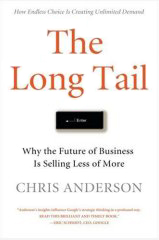 The Long Tail is a watershed book that reflects many of the profound socioeconomic changes wrought by the transition from the Industrial Economy to the Knowledge Economy. The “Long Tail” represents the splintering of the mass market—what is happening, why and how you can thrive in the new era of the niche. Moreover, it shows how the mass market was a temporary phenomenon that developed because niches were not economically viable for producers to address. The Long Tail is a watershed book that reflects many of the profound socioeconomic changes wrought by the transition from the Industrial Economy to the Knowledge Economy. The “Long Tail” represents the splintering of the mass market—what is happening, why and how you can thrive in the new era of the niche. Moreover, it shows how the mass market was a temporary phenomenon that developed because niches were not economically viable for producers to address.
Chris Anderson is editor-in-chief of Wired, and the book has an appreciation for culture, the economics of technology and the importance of innovation. It’s also very well written: Anderson tackles some fairly abstract concepts, but the reader doesn’t trip over them. It’s possible to read the book quickly, but there is plenty of substance for a detailed, reflective reading as well. Difficult to over-recommend!
The Long Tail offers an insightful look into the byte-oriented Knowledge Economy and its movement away from the zero-sum, bits-oriented Industrial Economy—and what this holds for business and culture. The book […]
 Consumer empowerment and disruption are being unleashed by the many-to-many Web. As we’ve been writing for some time, Web 2.0 is giving individuals collective voices that can rival the authority of global enterprises and governments, which is disruptive because it changes the rules. We call it Consumer Empowerment. Blogs, social networking, podcasts, wikis, vlogs and their intermediaries like Technorati, MySpace and iTunes give customers the tools to create and distribute content for free—instantly and globally. When rules change, you can quickly strengthen your market position by understanding and adapting more quickly than competitors. Consumer empowerment and disruption are being unleashed by the many-to-many Web. As we’ve been writing for some time, Web 2.0 is giving individuals collective voices that can rival the authority of global enterprises and governments, which is disruptive because it changes the rules. We call it Consumer Empowerment. Blogs, social networking, podcasts, wikis, vlogs and their intermediaries like Technorati, MySpace and iTunes give customers the tools to create and distribute content for free—instantly and globally. When rules change, you can quickly strengthen your market position by understanding and adapting more quickly than competitors.
Google any specific product, phrase or service, and you will notice that customer content is growing quickly, especially in specific, customer-centric areas that organizations aren’t focused on. Customers contribute customer-relevant content because they are passionate about the subject. Growing “tribes” of individuals connect, collaborate, and become smart very quickly. Threat: large organizations are losing control over the information about their reputations, products and services. Opportunity: adding value to these customer-led conversations can increase your credibility and appeal.
Large organizations attained their market power through efficiency, the hallmark of the […]
Excellent guidebook for succeeding in the online world, including social networking
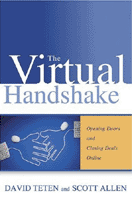 The Virtual Handshake is an immensely valuable book, both as a handbook to the virtual world for the business-oriented person and as a guide to purposeful networking. I was compelled to get it after seeing David Teten speak at a conference because he spoke with authority while explaining new things clearly. Allen and Teten have done a masterful job at writing an interesting book that is full of useful information. Moreover, they succeed at providing a conceptual framework, so the reader can make use of the information. It is also a fun read. The Virtual Handshake is an immensely valuable book, both as a handbook to the virtual world for the business-oriented person and as a guide to purposeful networking. I was compelled to get it after seeing David Teten speak at a conference because he spoke with authority while explaining new things clearly. Allen and Teten have done a masterful job at writing an interesting book that is full of useful information. Moreover, they succeed at providing a conceptual framework, so the reader can make use of the information. It is also a fun read.
As a marketing executive and a management consultant (strategy) since the early 1990s, I have helped to build parts of the virtual world the authors describe. I am very familiar with the topics, and I found the book useful on two key levels:
Conceptual: The virtual world is difficult to understand conceptually because it is boundaryless and serendipitous, and the authors describe what it is enough so you can get to the point: how to interact with it to accomplish what you want. This is extremely important […]
The Knowledge Economy, Ultimate Context for Understanding the Future welcomes you to the Post-Industrial World, which turns past assumptions on their heads.
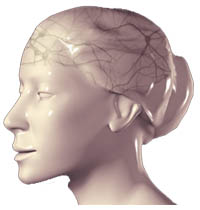 The Knowledge Economy is a post-industrial economy characterized by a highly developed information technology industry along with overproduction and commoditization in industrial and agricultural sectors. Widespread information technology (IT) adoption among producers and consumers enables all market participants to create and share information about all aspects of economic transactions. The creation, packaging and sharing of information is termed “knowledge.” In the Knowledge Economy, information about an underlying good creates most of the good’s differentiated value. The Knowledge Economy is a post-industrial economy characterized by a highly developed information technology industry along with overproduction and commoditization in industrial and agricultural sectors. Widespread information technology (IT) adoption among producers and consumers enables all market participants to create and share information about all aspects of economic transactions. The creation, packaging and sharing of information is termed “knowledge.” In the Knowledge Economy, information about an underlying good creates most of the good’s differentiated value.
Consumer mobilization and engagement in the Knowledge Economy renders many of the Industrial Economy’s rules invalid. In the Industrial Economy, consumers had little information relative to producers, they were isolated from each other, and they had no collective voice. They were at a disadvantage as market participants. The “second stage” of the Internet, “Web 2.0,” facilitates P2P (peer to peer) information sharing, and its tools are free to use and accessible to anyone with an Internet connection. Producers […]
|
|
 March 18, 2007, Chicago, USA—Today, The Global Human Capital Journal released its Review and The Unofficial LinkedIn User”s Guide to aid executives and professionals to mine the hidden value of the rapidly growing website. Founded in 2003, LinkedIn is a leading “social” network site for managing business relationships. It currently has over nine million global members who collaborate for professional purposes.
March 18, 2007, Chicago, USA—Today, The Global Human Capital Journal released its Review and The Unofficial LinkedIn User”s Guide to aid executives and professionals to mine the hidden value of the rapidly growing website. Founded in 2003, LinkedIn is a leading “social” network site for managing business relationships. It currently has over nine million global members who collaborate for professional purposes.
 LinkedIn is a “social” site that will prove to be of rare benefit to business executives and professionals in building individualized collaborative networks, as I explained in detail in the GHCJ Review of LinkedIn. However, LinkedIn is seriously lacking in providing a step-by-step guide to help the motivated executive to tap its real value. The functionality of the website is easy to use, but many of the finer points of LinkedIn are lost on the majority of users. This guide attempts to address that.
LinkedIn is a “social” site that will prove to be of rare benefit to business executives and professionals in building individualized collaborative networks, as I explained in detail in the GHCJ Review of LinkedIn. However, LinkedIn is seriously lacking in providing a step-by-step guide to help the motivated executive to tap its real value. The functionality of the website is easy to use, but many of the finer points of LinkedIn are lost on the majority of users. This guide attempts to address that. LinkedIn is a social network website that enables people to build and manage (mostly) business connections in order to discover jobs, ventures, new clients, etc. Unlike other social networking sites, its focus is business rather than social or entertainment.
LinkedIn is a social network website that enables people to build and manage (mostly) business connections in order to discover jobs, ventures, new clients, etc. Unlike other social networking sites, its focus is business rather than social or entertainment. I’ll risk using a hype-laden term like “Web 2.0” in the title: I think most of us have been around long enough to understand that hype doesn’t mean that nothing is there, although it can distract us from seeing things that we should be watching.
I’ll risk using a hype-laden term like “Web 2.0” in the title: I think most of us have been around long enough to understand that hype doesn’t mean that nothing is there, although it can distract us from seeing things that we should be watching. What does the Knowledge Economy Portend for the Industrial Economy organization?
What does the Knowledge Economy Portend for the Industrial Economy organization?  Academicians everywhere are struggling to improve their students’ competitive standings in the global Knowledge Economy, which levels the playing field in many respects. It is far easier to build a world-class competitor in the Knowledge Economy than it was in the Industrial Economy. A strong educational system is a must, along with a highly motivated population, decent infrastructure and incentives for foreign investment. In former times, being a world competitor necessitated gaining control of vast natural resources to produce a strong industrial base from which world-class armies and navies would be built. India currently exemplifies the Knowledge Economy model very well*, and countries worldwide have taken note.
Academicians everywhere are struggling to improve their students’ competitive standings in the global Knowledge Economy, which levels the playing field in many respects. It is far easier to build a world-class competitor in the Knowledge Economy than it was in the Industrial Economy. A strong educational system is a must, along with a highly motivated population, decent infrastructure and incentives for foreign investment. In former times, being a world competitor necessitated gaining control of vast natural resources to produce a strong industrial base from which world-class armies and navies would be built. India currently exemplifies the Knowledge Economy model very well*, and countries worldwide have taken note. The Long Tail is a watershed book that reflects many of the profound socioeconomic changes wrought by the transition from the Industrial Economy to the Knowledge Economy. The “Long Tail” represents the splintering of the mass market—what is happening, why and how you can thrive in the new era of the niche. Moreover, it shows how the mass market was a temporary phenomenon that developed because niches were not economically viable for producers to address.
The Long Tail is a watershed book that reflects many of the profound socioeconomic changes wrought by the transition from the Industrial Economy to the Knowledge Economy. The “Long Tail” represents the splintering of the mass market—what is happening, why and how you can thrive in the new era of the niche. Moreover, it shows how the mass market was a temporary phenomenon that developed because niches were not economically viable for producers to address. Consumer empowerment and disruption are being unleashed by the many-to-many Web. As we’ve been writing for some time, Web 2.0 is giving individuals collective voices that can rival the authority of global enterprises and governments, which is disruptive because it changes the rules. We call it Consumer Empowerment. Blogs, social networking, podcasts, wikis, vlogs and their intermediaries like Technorati, MySpace and iTunes give customers the tools to create and distribute content for free—instantly and globally. When rules change, you can quickly strengthen your market position by understanding and adapting more quickly than competitors.
Consumer empowerment and disruption are being unleashed by the many-to-many Web. As we’ve been writing for some time, Web 2.0 is giving individuals collective voices that can rival the authority of global enterprises and governments, which is disruptive because it changes the rules. We call it Consumer Empowerment. Blogs, social networking, podcasts, wikis, vlogs and their intermediaries like Technorati, MySpace and iTunes give customers the tools to create and distribute content for free—instantly and globally. When rules change, you can quickly strengthen your market position by understanding and adapting more quickly than competitors. The Virtual Handshake is an immensely valuable book, both as a handbook to the virtual world for the business-oriented person and as a guide to purposeful networking. I was compelled to get it after seeing David Teten speak at a conference because he spoke with authority while explaining new things clearly. Allen and Teten have done a masterful job at writing an interesting book that is full of useful information. Moreover, they succeed at providing a conceptual framework, so the reader can make use of the information. It is also a fun read.
The Virtual Handshake is an immensely valuable book, both as a handbook to the virtual world for the business-oriented person and as a guide to purposeful networking. I was compelled to get it after seeing David Teten speak at a conference because he spoke with authority while explaining new things clearly. Allen and Teten have done a masterful job at writing an interesting book that is full of useful information. Moreover, they succeed at providing a conceptual framework, so the reader can make use of the information. It is also a fun read. The Knowledge Economy is a post-industrial economy characterized by a highly developed information technology industry along with overproduction and commoditization in industrial and agricultural sectors. Widespread information technology (IT) adoption among producers and consumers enables all market participants to create and share information about all aspects of economic transactions. The creation, packaging and sharing of information is termed “knowledge.” In the Knowledge Economy, information about an underlying good creates most of the good’s differentiated value.
The Knowledge Economy is a post-industrial economy characterized by a highly developed information technology industry along with overproduction and commoditization in industrial and agricultural sectors. Widespread information technology (IT) adoption among producers and consumers enables all market participants to create and share information about all aspects of economic transactions. The creation, packaging and sharing of information is termed “knowledge.” In the Knowledge Economy, information about an underlying good creates most of the good’s differentiated value.